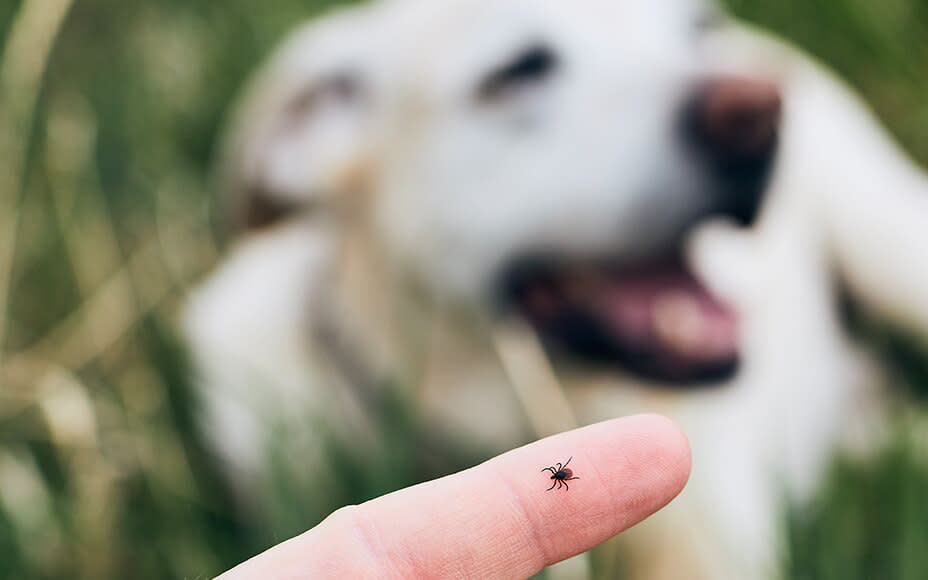How do I recognize ticks on dogs and remove them correctly? What diseases can ticks transmit to dogs? We provide you with information.
How to Protect Your Dog Against Ticks
Nature is blooming, it’s getting warmer, and both you and your furry friend are drawn to the forest to enjoy the good weather. Every year, pet owners are faced with the same issue: ticks lurking in meadows and trees, posing a threat to your canine companion. We’ll share our tips for tick season so that you can enjoy your walks carefree!
What Are Ticks, and Where Do They Live?
Ticks belong to ectoparasites; they live on an animal or human for some time and feed on the blood of their host. Once they have had enough blood, they drop off. They often lurk in grass, bushes, or trees, reaching their host in this way. It becomes dangerous when an infected tick bites your furry friend, as it can transmit potentially life-threatening diseases like Lyme disease during the bite.
Good to know:
The term “tick bite” is also commonly used, wherein ticks pierce the skin with a kind of sting at the bite site to then secure themselves with their sucking organs.

My Pet Has a Tick – What Now?
Removing Ticks Correctly :
Especially during the warm seasons, you should regularly check your furry friend for ticks and remove them properly if necessary. If you discover a tick on your pet, never pull it out with your bare fingers. In such attempts, often only the rear part of the tick’s body is torn off, leaving the head behind.
Ticks are best removed with dedicated tick tweezers or cards. Avoid twisting movements during removal, as this can also lead to the tick splitting. If you detect the tick promptly within 24 hours, when it is still small and not fully engorged with blood, the likelihood of infection with pathogens is relatively low.
What Diseases Can My Pet Get?
If a tick remains undetected on your pet’s body for an extended period, the risk of various tick-borne diseases increases. The most well-known disease is Lyme disease, with approximately 10-35% of ticks in the US carrying Borrelia.
Although transmission and infection do not necessarily lead to the outbreak of the disease, an incubation period of up to 5 months may mean that the illness is not immediately noticeable. The infection rate for Lyme disease is approximately 17 to 61%, with only 5-10% of dogs becoming ill. Joint or heart diseases, as well as fever and loss of appetite, may indicate Lyme disease.
Infections with other diseases transmitted by ticks can also lead to symptoms such as fever, loss of appetite, diarrhea, and vomiting, such as with tick-borne encephalitis (TBE) or anaplasmosis. If you observe changes in your pet’s behavior or lethargy after a tick bite, seek veterinary advice. If diagnosed early, veterinarians typically prescribe antibiotics against the pathogens, and your furry friend can fully recover.

Prevention: Proper Tick Prevention
Unlike humans, there is no TBE vaccination for dogs. However, dogs can still become infected with TBE and develop symptoms.
There is a vaccine against Lyme disease for dogs. Given the various courses of the disease, this vaccine is recommended to protect your furry friend. Other means of prevention include various tick repellents. These range from specific collars to tablets and drops applied to the nape of the neck to keep ticks away.
Many collars have the advantage of also being effective against fleas and working year-round. Drops, on the other hand, are applied locally at the beginning of tick season.
Various home remedies such as black seed oil are also believed to be effective against ticks. Although there are no scientific studies on this, many owners report positive effects.
Can My Furry Friend Infect Me?
If your furry friend becomes infected with pathogens through a tick bite, it’s normal to be concerned about your health. Reassurance: No, your furry friend cannot infect you. This also applies the other way around. Transmission can only occur from tick to host.


